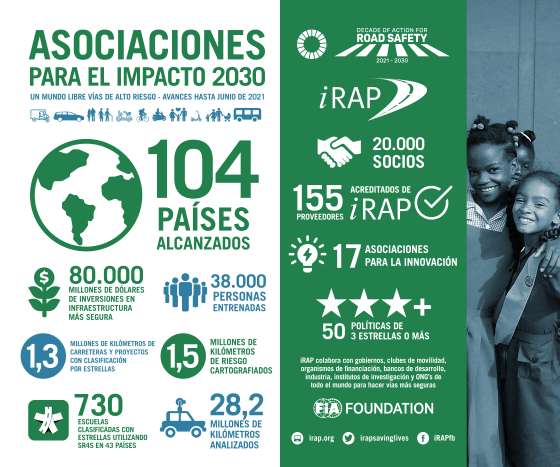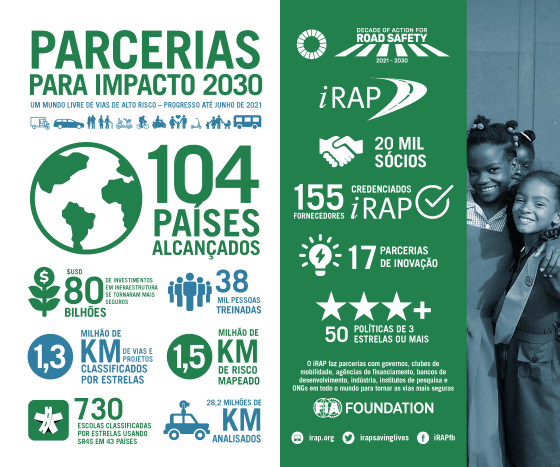As a charity, iRAP’s focus is on enabling others and creating locally-led programmes and partnerships for 2030 impact. The latest metrics as at 30 June chart growth in safer roads activities and investments across the world along with the capacity building focus as partners capitalise on online training opportunities to boost skills during COVID restrictions.
The figures, drawn biannually, reveal over 38,000 people have been trained in online courses offered in 16 languages, many of which are free-of-charge. 155 suppliers in 37 countries and 15 inspection systems are now accredited to support iRAP specification services. As we unite to create a world free of high-risk roads as part of the Second Decade of Action for Road Safety, the ability for partners to upskill and support their own national RAP Programmes is being supported in a virtual self-paced environment.
iRAP partners worldwide have now undertaken over 1.2 million kilometres of Star Rating Assessments and Designs. In the last 6 months, Cyprus and Ecuador have undertaken Star Rating assessments for the first time and significant Star Rating activity has occurred in Australia, Mexico, USA, South Africa, Serbia, India, Panama, Brazil, China and Costa Rica. 81,700km of “light” Star Ratings have also been completed with recent activity in Australia and Thailand.
The safety of 730 schools in 43 countries has been assessed using the Star Rating for Schools application helping to inform safer school journeys and protect vulnerable youth, with many schools now upgraded.
A total of 1.5 million kilometres of Risk Mapping has been completed worldwide with 37,000km of Risk Mapping undertaken in the last 6 months including Spain, Serbia and Croatia.
Star Rating for Design (SR4D) is improving the safety of road designs and ensuring they meet the 3-star or better global standard before construction. Australia, Bulgaria, Brazil, Cayman Islands, Chile, Colombia, Cote d’Ivoire, El Salvador, Kazakhstan and Uganda have all improved the safety of their designs in the last 6 month period.
Nearly $80 billion of investment in 58 countries has been made safety informed by iRAP assessments, with USD$49.3 billion in high-income countries and $30.6 billion in low- and middle-income countries.
Over 28.2 million kilometres of data has been analysed in iRAP’s free online software ViDA used by 11,388 registered users, with an additional 1 million km processed since January.
3-star or better policies set by governments and agencies across the world exemplify road safety leadership setting the bar for safer roads achievement as part of national and local road safety strategies. The governments of Vietnam, Victoria in Australia and Brazil, as well as the United Nations Economic Commission for Europe (UNECE) have recently added to the list of 50 3-star or better policies and guidelines that exist worldwide including iRAP metrics and performance targets.
iRAP CEO Rob McInerney said, “Thanks to the donor support of the FIA Foundation and the energy and expertise of our 20,000 partners worldwide iRAP is proud to see the great progress being made to eliminate high-risk roads in over 100 countries worldwide.
“We applaud our partners’ success as demonstrated in these latest metrics and encourage all countries to be ambitious in their policies and programmes to achieve UN Targets 3 and 4 to ensure all new roads are built to a 3-star or better standard for all road users (Target 3), and more than 75% of travel is on the equivalent of 3-star or better roads for all road users by 2030 (Target 4).”
Achieving >75 per cent of travel on 3-star or better roads by 2030 stands to save an estimated 450,000 lives every year and 100 million deaths and serious injuries over the 20-year life of treatments.




















